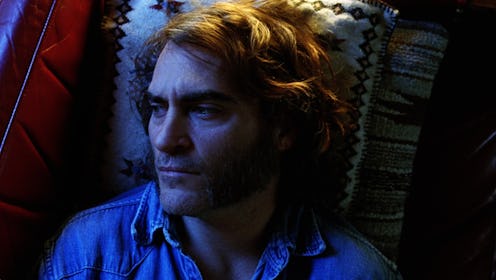Entertainment
Best Picture Is 2015's Least Important Category

Each year, the general public looks to the Academy Awards to find out which films it needs to head back to theaters (or back into the libraries of its VOD or streaming services) to see, honing in specifically on the Best Picture category for the chief recommendations. But this latest batch of Oscars might actually be leading people astray: the Best Picture lineup could in fact be the least important category to which people should be paying mind.
Don’t get me wrong, it has some winners — the insuperably significant Selma, the charmingly intimate Boyhood, and the magical comedy spectacle that is The Grand Budapest Hotel. But (with the outrageous exception of Selma ) you can find these power players represented in other categories, alongside movies that far outweigh the remainder of the Best Picture lineup’s mediocre filler.
The Academy would have you believe that The Imitation Game, The Theory of Everything, and American Sniper are the best you can do in your forays through the cinema of 2014. But a glance at some of the smaller, more easily overlooked categories of the latest Oscar nominations will show you the true upper tier of the past year’s big screen output. Take a gander.
The Acting Categories
After Best Picture, folks are most inclined to look toward the Best Actor and Actress categories to figure out which performance-based pictures might be worth a go. Leaning toward Actress will do you well this year, as four of the five films represented therein are damn near glorious, and not a one of them is represented anyplace else (with the exception of one Supporting Actress nomination).
Still Alice: Julianne Moore tops even our high expectations of what she can do in this portrait of a professor and mother in her mid 50s who faces a sudden diagnosis with early onset Alzheimer’s disease.
Wild: A trifle more uplifting, Reese Witherspoon plays to her impossibly unfading youthfulness in this story of a woman on a quest for self-discovery along the Pacific Crest Trail; equal parts harrowing and hilarious thanks to Witherspoon’s panache and Nick Hornby’s clever script.
Gone Girl: Severe pulpy fun, wrapped up in a sleek conversation about gender politics and romantic relationships in modern America. This de facto murder mystery has plenty to say and subvert about its succulent themes, but doesn’t get too worked up over its cause to kick back and goof off with Ben Affleck, Rosamund Pike, and the rich supporting cast.
Two Days, One Night: A psychological and sociological feast that’s as inviting as it is tough to watch (at times), the French-Belgian drama about conversations, both aloud and internal, offers Marion Cotillard her finest, albeit most downplayed, work yet.
Writing
The Best Original and Adapted Screenplay categories are reliable sources for some of the best movies of any given year; while a few of the Best Picture’s lackluster inhabitants are reproduced here, we also see its gems rightfully represented (Boyhood and Grand Budapest snag Original Screenplay nods, and Selma is conspicuously absent). But as for the unique entries:
Nightcrawler: A weird, twisted embrace of an early era Martin Scorsese’s bloody nihilism, with a touch of new age lunacy tossed in for good measure. Jake Gyllenhaal is dynamic as the bug-eyed creep who takes command of a sinister industry (crime photography) in this picture, but the weird and unrelenting script is especially charming.
Inherent Vice: Over on the Adapted Screenplay side, we find one of the most joyful, tenacious, and complicated movies of 2014. Paul Thomas Anderson’s hybrid of mystery thriller, character piece, period drama, social commentary, genre deconstruction, and screwball comedy turns up a might hard to swallow, and in the best way possible. The pseudo-Simpsonian world he builds behind ambling star Joaquin Phoenix is a sight to behold, even if it takes you two or three watches to find your way to his fraying conclusion.
Animation
Without a Pixar film represented, not to mention that hotly disputed Lego Movie snub, the Animation category is bound to suffer from lack of interest. But mind you, it has one of the very best and most touching movies to hit theaters in 2014: The Tale of Princess Kaguya, a Studio Ghibli production about a magical young girl who sprouts from a piece of bamboo and grows to a life of royalty. The story might sound bland and hollow, but it is in fact a heartbreaking allegory for growing up… even more powerful, maybe, than Boyhood is (I know, I know, that’s heresy).
Foreign Language
A complicated medley of sorrow and comedy comes in the Foreign Language Film category, in the form of a small, short, and simple little movie called Ida. The Polish drama, set in Europe in the wake of World War II, unites an orphaned nun-in-training with her only living family member: her freewheeling, hard-drinking Jewish aunt, who at first wants nothing to do with this representation of her dark and tragic past. But the union of young Anna and aging Wanda opens up new worlds for each, both for the better and worse. Though not without its sense of humor, the story is genuinely heartrending in its exploration of loss, both of the external and the internal.
Documentary
The only recent movie to rival Selma in sociopolitical importance would have to be Citizenfour, the magnificently gripping documentary about Edward Snowden’s work to publicize the criminal activity of the United States’ National Security Agency. Not only is Citizenfour chock full of significant information, it’s about as thrilling as the finest spy movie you’d ever want to watch (with the upped stakes of it all being entirely real). This year’s Best Documentary category might have a few big omissions, but its most important movie is duly represented.
Images: Warner Bros.; Cinéart; Open Road Films; Toho; Soloban; RADiUS-TWC